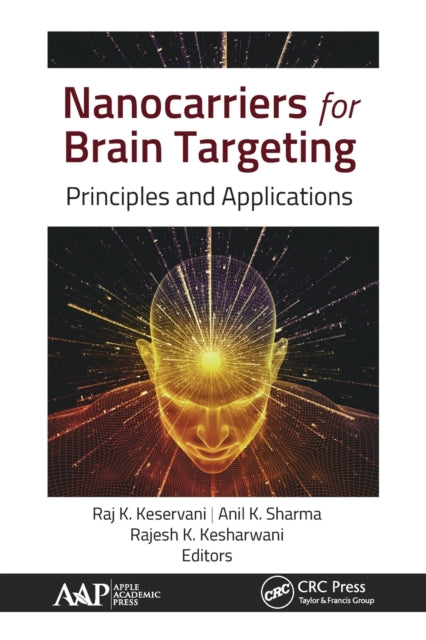Shulph Ink
Nanocarriers for Brain Targeting: Principles and Applications
Nanocarriers for Brain Targeting: Principles and Applications
YOU SAVE £3.99
- Condition: Brand new
- UK Delivery times: Usually arrives within 2 - 3 working days
- UK Shipping: Fee starts at £2.39. Subject to product weight & dimension
Bulk ordering. Want 15 or more copies? Get a personalised quote and bigger discounts. Learn more about bulk orders.
Couldn't load pickup availability
- More about Nanocarriers for Brain Targeting: Principles and Applications
Nanocarriers for Brain Targeting: Principles and Applications explores recent research on brain physiology and the development of drug delivery systems to target brain ailments, such as Alzheimers disease, Parkinsons disease, and multiple sclerosis.
Format: Paperback / softback
Length: 512 pages
Publication date: 30 September 2022
Publisher: Apple Academic Press Inc.
This comprehensive new volume, Nanocarriers for Brain Targeting: Principles and Applications, delves into the latest advancements in brain physiology and the development of drug delivery systems. It presents a diverse range of strategies employed to achieve targeted drug delivery to the brain. The nanocarriers discussed in this text encompass nanoparticles, vesicular carriers, carriers with carbon as a core constituent, dispersed systems, and more.
The unique anatomy and physiology of the brain set it apart from other organs. Over the past few decades, significant research has been conducted on brain ailments in response to the high number of hospitalizations caused by age-related central nervous system disorders. The prevalence of various diseases, including Alzheimer's disease, Parkinson's disease, amyotrophic lateral sclerosis, multiple sclerosis, HIV-dementia, and more, affects approximately 1.5 billion people worldwide, and this number is expected to reach 1.9 billion by 2020. Nanocarriers for drug delivery to the brain are seen as a promising solution to this growing problem.
The brain is a complex organ with a highly developed network of blood vessels and neurons. This intricate structure makes it challenging to deliver drugs directly to the target site, as they are susceptible to degradation and filtration by the blood-brain barrier (BBB). Nanocarriers, however, offer a solution to this challenge by providing a means to bypass the BBB and deliver drugs directly to the brain.
One of the key advantages of nanocarriers is their ability to target specific cells or tissues within the brain. By modifying the properties of the nanocarrier, such as its size, shape, and surface chemistry, researchers can tailor the delivery of drugs to specific regions of the brain, such as the hippocampus, cortex, or striatum. This targeted delivery can improve the efficacy of drugs and reduce side effects, as the drugs are delivered only to the cells or tissues that require them.
Another advantage of nanocarriers is their ability to enhance drug bioavailability. The BBB is a highly efficient barrier that protects the brain from harmful substances, including drugs. Nanocarriers, however, can penetrate the BBB by exploiting its porosity or by using specific carrier molecules that can bind to the BBB receptors. This enhanced drug bioavailability can increase the amount of drug that reaches the brain and improves the therapeutic effects of the drug.
In addition to their ability to target specific cells or tissues, nanocarriers can also be designed to release drugs in a controlled manner. This controlled release can be achieved by modifying the properties of the nanocarrier, such as its degradation rate or its release mechanism. By controlling the release of drugs, researchers can achieve a sustained therapeutic effect and reduce the risk of side effects.
There are several types of nanocarriers that can be used for drug delivery to the brain, including nanoparticles, liposomes, polymer-based nanocarriers, and protein-based nanocarriers. Each type of nanocarrier has its own advantages and disadvantages, and researchers are continually exploring new and innovative nanocarrier platforms to improve drug delivery to the brain.
In conclusion, Nanocarriers for Brain Targeting: Principles and Applications provides a comprehensive overview of the latest research on brain physiology and the development of drug delivery systems. It explores a diverse range of strategies employed to achieve targeted drug delivery to the brain, including nanoparticles, vesicular carriers, carriers with carbon as a core constituent, dispersed systems, and more. The unique anatomy and physiology of the brain render it different from other organs, making it challenging to deliver drugs directly to the target site. Nanocarriers, however, offer a solution to this challenge by providing a means to bypass the BBB and deliver drugs directly to the brain. By tailoring the properties of the nanocarrier and controlling the release of drugs, researchers can achieve a sustained therapeutic effect and reduce the risk of side effects. With continued research and development, nanocarriers have the potential to revolutionize the treatment of brain ailments and improve the quality of life for millions of people worldwide.
Weight: 453g
Dimension: 234 x 156 (mm)
ISBN-13: 9781774634127
This item can be found in:
UK and International shipping information
UK and International shipping information
UK Delivery and returns information:
- Delivery within 2 - 3 days when ordering in the UK.
- Shipping fee for UK customers from £2.39. Fully tracked shipping service available.
- Returns policy: Return within 30 days of receipt for full refund.
International deliveries:
Shulph Ink now ships to Australia, Belgium, Canada, France, Germany, Ireland, Italy, India, Luxembourg Saudi Arabia, Singapore, Spain, Netherlands, New Zealand, United Arab Emirates, United States of America.
- Delivery times: within 5 - 10 days for international orders.
- Shipping fee: charges vary for overseas orders. Only tracked services are available for most international orders. Some countries have untracked shipping options.
- Customs charges: If ordering to addresses outside the United Kingdom, you may or may not incur additional customs and duties fees during local delivery.


